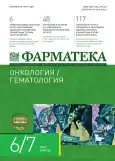Evaluation of long-term results of treatment of patients with residual tumors (including those with minimal forms of ypT1abN0), with pathomorphological complete response (pCR) after neoadjuvant systemic therapy, with primary minimal breast cancer (pT1abN0M0)
- Authors: Pesotsky R.S.1, Semiglazov V.F.1,2, Krivorotko P.V.1, Tabagua T.T.1, Zernov K.Y.1, Emelyanov A.S.1, Semiglazova T.Y.1, Amirov N.1, Mortada V.V.1, Ulrikh D.G.1, Levchenko V.E.3, Rychagov K.Y.1, Zirov K.Y.4, Evseev V.N.5
-
Affiliations:
- N.N. Petrov National Medical Research Center of Oncology
- North-Western State Medical University n.a. I.I. Mechnikov
- City Clinical Oncological Dispensary
- Russian Biotechnological University (ROSBIOTECH)
- LLC MEDSI
- Issue: Vol 30, No 6/7 (2023)
- Pages: 59-67
- Section: Original articles
- Published: 22.07.2023
- URL: https://journals.eco-vector.com/2073-4034/article/view/562797
- DOI: https://doi.org/10.18565/pharmateca.2023.6-7.59-67
- ID: 562797
Cite item
Abstract
Background. Initially, minimal tumors are characterized by high survival rates, which are proved by international and domestic studies. It is required to clarify the survival rates in the presence of a minimal residual tumor (ypT <10mm) after neoadjuvant systemic therapy in patients with breast cancer (BC) and to compare with primary minimal forms of BC (pT1a-b N0M0), characterized by the most favorable prognosis.
Objective. Improvement of the effectiveness of treatment of residual minimal forms (ypT1a-b) of BC after NST.
Methods. The study included 602 patients aged 18–65 years with early and locally advanced I–IIIC stage T1-3N1-3M0 breast cancer, who underwent complex or combined treatment. This study included patients treated at the N.N. Petrov National Medical Research Center of Oncology from 2015 to 2021.
Results and discussion. Our data analysis revealed that the survival rates (DFS and OS) of patients with minimal residual tumor after neojuvant systemic therapy were not comparable with those in the group of patients with primary minimal breast cancer.
Conclusion. After reaching a complete pathomorphological response of the tumor to NST (RCB 0), the 5-year disease-free (DFS) and overall (OS) survival rates (DFS – 78.5%; OS – 90.4%) were inferior to the survival rates of patients with primary minimal breast cancer (pT1ab N0M0) [DFS – 86.4%; OS – 98.6%].
Full Text
About the authors
Roman S. Pesotsky
N.N. Petrov National Medical Research Center of Oncology
Author for correspondence.
Email: shipmeback@gmail.com
ORCID iD: 0000-0002-2573-2211
Oncologist, Department of Breast Tumors
Russian Federation, St. PetersburgV. F. Semiglazov
N.N. Petrov National Medical Research Center of Oncology; North-Western State Medical University n.a. I.I. Mechnikov
Email: shipmeback@gmail.com
ORCID iD: 0000-0003-0077-9619
Russian Federation, St. Petersburg; St. Petersburg
P. V. Krivorotko
N.N. Petrov National Medical Research Center of Oncology
Email: shipmeback@gmail.com
ORCID iD: 0000-0002-4898-9159
Russian Federation, St. Petersburg
T. T. Tabagua
N.N. Petrov National Medical Research Center of Oncology
Email: shipmeback@gmail.com
ORCID iD: 0000-0003-1471-9473
Russian Federation, St. Petersburg
K. Yu. Zernov
N.N. Petrov National Medical Research Center of Oncology
Email: shipmeback@gmail.com
ORCID iD: 0000-0002-2138-3982
Russian Federation, St. Petersburg
A. S. Emelyanov
N.N. Petrov National Medical Research Center of Oncology
Email: shipmeback@gmail.com
ORCID iD: 0000-0002-0528-9937
Russian Federation, St. Petersburg
T. Yu. Semiglazova
N.N. Petrov National Medical Research Center of Oncology
Email: shipmeback@gmail.com
ORCID iD: 0000-0002-4305-6691
Russian Federation, St. Petersburg
N. Amirov
N.N. Petrov National Medical Research Center of Oncology
Email: shipmeback@gmail.com
ORCID iD: 0000-0002-2421-3284
Russian Federation, St. Petersburg
V. V. Mortada
N.N. Petrov National Medical Research Center of Oncology
Email: shipmeback@gmail.com
ORCID iD: 0000-0002-1982-5710
Russian Federation, St. Petersburg
D. G. Ulrikh
N.N. Petrov National Medical Research Center of Oncology
Email: shipmeback@gmail.com
ORCID iD: 0000-0002-1346-933X
Russian Federation, St. Petersburg
V. E. Levchenko
City Clinical Oncological Dispensary
Email: shipmeback@gmail.com
ORCID iD: 0009-0003-6597-376X
Russian Federation, St. Petersburg
K. Yu. Rychagov
N.N. Petrov National Medical Research Center of Oncology
Email: shipmeback@gmail.com
ORCID iD: 0000-0003-4118-6430
Russian Federation, St. Petersburg
K. Y. Zirov
Russian Biotechnological University (ROSBIOTECH)
Email: shipmeback@gmail.com
ORCID iD: 0000-0001-5486-7708
Russian Federation, Moscow
V. N. Evseev
LLC MEDSI
Email: shipmeback@gmail.com
ORCID iD: 0000-0003-3765-5898
Russian Federation, St. Petersburg
References
- Gallager H., Martin G. An orientation to the concept of minimal carcinoma. Cancer. 1971;l(28):1505–507.
- Bedwani R., et al. Management and survival of female patients with “minimal” breast cancer: As observed in the long-term and short-term surveys of the American College of Surgeons.Cancer. 1981;47(12):2769–78. doi: 10.1002/1097-0142(19810615)47:12 <2769::aid-cncr2820471202>3.0.co;2-7.
- Семиглазов В.В., Семиглазов В.Ф., Ермаченко-ва А.М. Минимальные формы рака молочной железы. Вопросы онкологии. 2011;57:702–6. [Semiglazov V.V., Semiglazov V.F., Ermachenkova A.M. Minimal forms of breast cancer. Voprosy onkologii. 2011;57:702–6. (In Russ.)].
- Mathew J., et al. Neoadjuvant chemotherapy for locally advanced breast cancer: A review of the literature and future directions. Eur J Surg Oncol (EJSO). 2009;2(35):113–22. doi: 10.1016/j.ejso.2008.03.015.
- Semiglazov V.F., et al. Primary (neoadjuvant) chemotherapy and radiotherapy compared with primary radiotherapy alone in stage IIb-IIIa breast cancer. Ann Oncol. 1994;5(7):591–95. doi: 10.1093/oxfordjournals.annonc.a058929.
- Weiss A., et al. Validation Study of the American Joint Committee on Cancer Eighth Edition Prognostic Stage Compared With the Anatomic Stage in Breast Cancer. JAMA Oncol. 2018;2(4):203. doi: 10.1001/jamaoncol.2017.4298.
- Alba E., et al. Chemotherapy (CT) and hormonotherapy (HT) as neoadjuvant treatment in luminal breast cancer patients: results from the GEICAM/2006-03, a multicenter, randomized, phase-II study. Ann Oncol. 2012;12(23):3069–74. doi: 10.1093/annonc/mds132.
- Bianchini G., et al. Immune modulation of pathologic complete response after neoadjuvant HER2-directed therapies in the NeoSphere trial. Ann Oncol. 2015;12(26):2429–36. doi: 10.1093/annonc/mdv395.
- Golshan M., et al. Impact of neoadjuvant therapy on eligibility for and frequency of breast conservation in stage II–III HER2-positive breast cancer: surgical results of CALGB 40601 (Alliance). Breast Cancer Res Treat. 2016;2(160):297–304. doi: 10.1007/s10549-016-4006-6.
- Golshan M., et al. Breast Conservation After Neoadjuvant Chemotherapy for Triple-Negative Breast Cancer. JAMA Surgery. 2020;3(155):e195410. doi: 10.1001/jamasurg.2019.5410.
- Salgado R., et al. Tumor-Infiltrating Lymphocytes and Associations With Pathological Complete Response and Event-Free Survival in HER2-Positive Early-Stage Breast Cancer Treated With Lapatinib and Trastuzumab. JAMA Oncology. 2015;4(1):448. doi: 10.1001/jamaoncol.2015.0830.
- Kim H.J., et al. Efficacy of neoadjuvant endocrine therapy compared with neoadjuvant chemotherapy in pre-menopausal patients with oestrogen receptor-positive and HER2-negative, lymph node-positive breast cancer. Breast Cancer Research. 2020;1(22):54. doi: 10.1186/s13058-020-01288-5.
- Matuschek C., Jazmati D., Bolke E., et al. Post-Neoadjuvant Treatment Strategies in Breast Cancer. Cancers. 2022;14(5):1246. doi: 10.3390/cancers14051246.
Supplementary files








